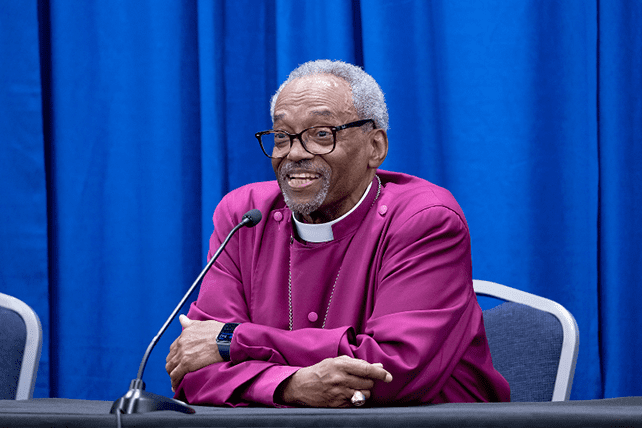(RNS) — Bishop Michael Curry may best be remembered for his electrifying sermon on the power of love at the 2018 royal wedding of Prince Harry and Meghan Markle. To Episcopalians who knew Curry as their presiding bishop, his turn on the world stage was merely recognition of Curry’s rock star preaching skills. Fluent in a Black preaching tradition, he is able to captivate both the well-heeled and the working class.
But when COVID-19 hit and churches closed, Episcopalians also saw his down-to-earth skills of improvisation. Staffers at the denomination’s New York headquarters had appealed to the boss to deliver his online Easter message from a local church, using a stained-glass window as a backdrop.
Curry, never big on pomp and circumstance, said a church would be unnecessary: He was fine delivering the message from his home study in Raleigh, North Carolina. He gave his Easter 2021 sermon from his desk, with a tableau of family photos and a red Buffalo Bills helmet perched atop a stack of books behind him. He spoke directly, fireside-chat-like, about wanting to meet Mary Magdalene in heaven.
On Thursday (Oct. 31), Curry, 71, completed his nine-year term as presiding bishop of the Episcopal Church, and it’s his casual style and his capacity to adapt and improvise that may be his signature, even more than his historic election as the first African American to lead a mostly white denomination. The most beloved presiding bishop of recent decades, he has an easy manner that helped the church weather a period of rapid change.
“There’s a hymn that has a verse in it that says ‘New occasions teach new duties; Time makes ancient good uncouth,’” he said, citing from memory a 19th-century poem by James Russell Lowell, an ardent abolitionist.
“You have to learn new realities, you have to take the ancient principles and you’ve got to apply them in new ways,” Curry said.
Curry doesn’t rue the decades-long denominational decline that has affected mainline Protestant denominations, including his own. Under his watch the Episcopal Church lost some 300,000 members, going from 1.9 million members in 2015 to just below 1.6 million in 2022, the latest year for which figures are available.
He pointed out that social forces beyond the Episcopal Church are at work and said he believed the church should not expect the future to look like the past.
Speaking to RNS via Zoom from his home, his preferred way of communicating, Curry, who has suffered a series of health challenges in the past few years, recalled that his mission was to remind Episcopalians that they are a part of a Jesus movement more than they are part of an institution. The institution should be designed to serve the movement, not the other way around.
His successor appears to have gotten the message. On Saturday, Sean Rowe will be installed as the 28th presiding bishop in a smaller, simpler service with less than 130 people present and everyone else watching on a livestream.
Curry is proud of some of his administrative accomplishments, most notably the creation of the Episcopal Coalition for Racial Equity and Justice, a voluntary organization charged with dismantling white supremacy across the denomination. He acknowledged that he has not escaped criticism for administrative missteps: Curry is the subject of an internal clergy misconduct complaint for his response to abuse allegations against a former Michigan bishop alleged to have physically and emotionally abused his now ex-wife and sons.
But as presiding bishop Curry set for himself a larger goal — serving as evangelist in chief, drawing the church back to its core gospel message: Jesus’ lesson on love.

